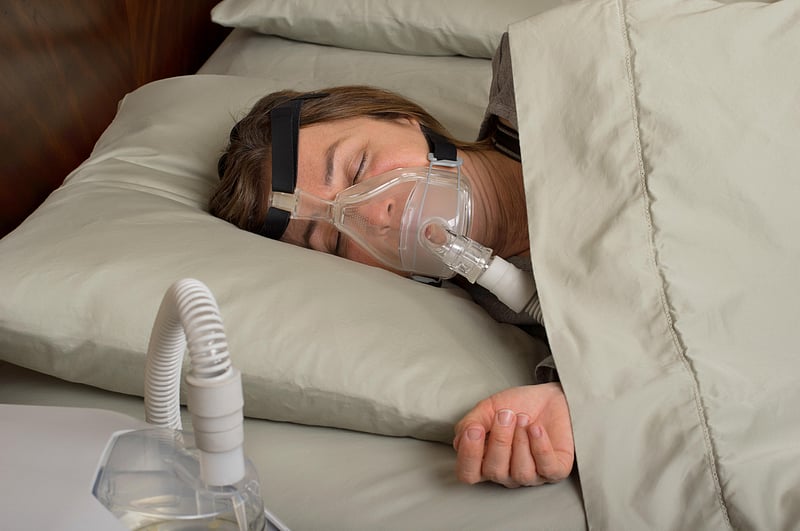Recursos del Paciente
Manténgase sano!
Scans Suggest Sleep Apnea Could Be Harming Your Brain
- May 11, 2023
- Alan Mozes
- HealthDay Reporter

Poor sleep brought on by sleep apnea may ultimately undermine the brain health of older men and women, new research suggests.
The concern stems from a new brain scan investigation that involved 140 sleep apnea patients.
"Sleep apnea is a medical condition in which patients ... stop breathing during sleep, which can affect their sleep quality by causing multiple arousals and dropping oxygen levels,"said lead study author Dr. Diego Carvalho. He is an assistant professor of neurology at the Mayo Clinic Center for Sleep Medicine in Rochester, Minn.
Sleep apnea "has been associated with increased risk of high blood pressure, diabetes, heart attack, stroke, cognitive impairment and dementia,"Carvalho said.
And, he noted, it is known to "cause a range of harmful effects in the brain,"as blood pressure and heart rate rise, oxygen levels drop and sleep is disrupted.
Importantly, sleep apnea can limit a person's ability to get and maintain "deep sleep."
Deep sleep, which begins about an hour after falling asleep, is essential to the body's ability to repair and regenerate tissue, bolster the immune system, and build bone and muscle, according to the Cleveland Clinic. Getting enough of it is, therefore, considered a key indicator of good quality shut-eye.
With that in mind, Carvalho and his team set out to see whether the impact of sleep apnea on deep sleep might somehow be linked to the long-term risk for stroke, dementia and Alzheimer's disease.
The study included 140 participants (average age, 73 years). None had any signs of dementia, Alzheimer's or trouble with thought processing when the study was conducted. Their sleep apnea ranged in severity from mild to severe.
Each participant underwent brain scans and an overnight study in a sleep lab. The scans offered insight into the health of nerve fibers that make up the brain's white matter. White matter damage can undermine communication between different parts of the brain. It often shows up as tiny lesions that accumulate with age.
The overnight study allowed researchers to track sleep patterns.
The result: After comparing sleep to scans, the researchers found that patients who got the least deep sleep -- and, therefore, had the poorest overall sleep quality -- were also the most likely to show telltale signs of white matter damage.
For every 10-point drop in the percentage of deep sleep, the investigators found an increase in white matter damage similar to the effect of aging an additional 2.3 years.
"Poor sleep from severe sleep apnea or decreased deep sleep may be involved in white matter abnormalities thought to contribute to the risk of cognitive impairment, dementia and stroke,"Carvalho said.
But the study authors also pointed out some key caveats.
For one thing, the association between less deep sleep and more white matter damage "was just evident in patients with severe sleep apnea,"not among those with less advanced disease.
And investigators placed a heavy emphasis on "association."
The findings, they said, only highlight a link between poor sleep quality and higher risk for mental decline and stroke down the road. They don't yet prove that one actually causes the other.
"That being the case, future studies should assess whether strategies to improve sleep quality and enhance this stage of sleep could help prevent development of progression of white matter abnormalities,"Carvalho added.
Dr. Ivana Rosenzweig, head of the Sleep and Brain Plasticity Center at King's College London in the United Kingdom, reviewed the new study findings.
She stressed that "sleep apnea is a serious public health problem that affects most of our body organs and our brain,"with the number of affected patients predicted to rise in coming years.
"Whilst the jury is still out regarding how the deep sleep may exactly affect memory, a number of studies show strong links between normal aging, less time spent in deep sleep and memory issues,"Rosenzweig said.
She added that the new findings "appear to support a growing body of literature which suggests that sleep apnea may in some susceptible individuals lead to accelerated aging processes in the body and the brain."
Rosenzweig's take: "Studies such as this are important, as they help to raise awareness of the importance of sleep quality in our battle against dementia,"while also indicating "how important certain sleep building blocks and rhythms may be for the health of our brain."
The findings were published online May 10 in the journal Neurology.
More information
There's more about sleep at the Cleveland Clinic.
SOURCE: Diego Carvalho, MD, MS, assistant professor, neurology, Center for Sleep Medicine, Mayo Clinic, Rochester, Minn.; Ivana Rosenzweig, MD, PhD, head, Sleep and Brain Plasticity Center, Institute of Psychiatry, Psychology and Neuroscience, King's College London, U.K.; Neurology, May 10, 2023, online

